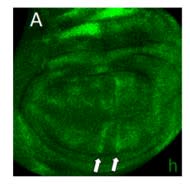
Cat. #152590
Anti-VEGF [VG76e]
Cat. #: 152590
Sub-type: Primary antibody
Unit size: 100 ug
Availability: 10-12 weeks
Target: Vascular Endothelial Growth Factor (VEGF)
Class: Recombinant
Application: FACS ; IHC ; IF ; IP ; WB
Reactivity: Human ; Mouse
Host: Mouse
£300.00
This fee is applicable only for non-profit organisations. If you are a for-profit organisation or a researcher working on commercially-sponsored academic research, you will need to contact our licensing team for a commercial use license.
Contributor
Inventor: Roy Bicknell
Institute: Absolute Antibody ; University of Oxford
Tool Details
*FOR RESEARCH USE ONLY
- Name: Anti-VEGF [VG76e]
- Clone: rVG76e
- Tool sub type: Primary antibody
- Class: Recombinant
- Conjugation: Unconjugated
- Molecular weight: 38-44 kDa
- Reactivity: Human ; Mouse
- Host: Mouse
- Application: FACS ; IHC ; IF ; IP ; WB
- Description: Recombinant monoclonal antibody with use investigating MVCD1, angiogenesis and various cancers.
- Immunogen: Human VEGF189 expressed in E. coli.
- Immunogen uniprot id: P15692
- Isotype: IgG1
- Recommended controls: VEGF recombinant protein.
Target Details
- Target: Vascular Endothelial Growth Factor (VEGF)
- Molecular weight: 38-44 kDa
- Tissue cell line specificity: VEGF recombinant protein.
- Target background: VEGF is a 34-43 kD polypeptide growth factor, part of the PDGF family. There are 7 homo-dimeric isoforms (A-G) with VEGF 121, VEGF 165 and VEGF189 being the most extensively studied (F,D and B respectively). They are generated by alternative splicing and binding to VEGF receptors (FLT-1 and KDR) which are selectively expressed on vascular endothelial cells. VEGF elicits mitogenic effects on endothelial cells and is strongly angiogenic, with a role in cancer and metastasis. VEGF is involved in vasculogenesis and endothelial growth. VEGF expression is potentiated, and the protein is secreted by tumour cells in response to hypoxia, by activated oncogenes, growth factors, nitric oxide and a variety of cytokines. Defects in VEGFA are linked to MVCD1 (microvascular complications of diabetes type 1) and VEGF polymorphisms are associated with susceptibility to multiple cancers, e.g. glioma, HCC, ovarian, bladder, prostate, breast cancer etc. VEGF is an angiogenic growth factor and a prognostic indicator for cancer when detected in serum. This is a recombinant version of the anti-VEGF monoclonal antibody. This antibody binds VEGF-A.
Applications
- Application: FACS ; IHC ; IF ; IP ; WB
Handling
- Format: Liquid
- Concentration: 1 mg/ml
- Unit size: 100 ug
- Storage buffer: PBS only
- Storage conditions: Store at -20° C frozen. Avoid repeated freeze / thaw cycles
- Shipping conditions: Shipping at 4° C
References
- Original hybridoma first published in Waterfield et al. 1982. J Cell Biochem. 20(2):149-61. PMID: 6188757.
- A monoclonal antibody to the human epidermal growth factor receptor.



